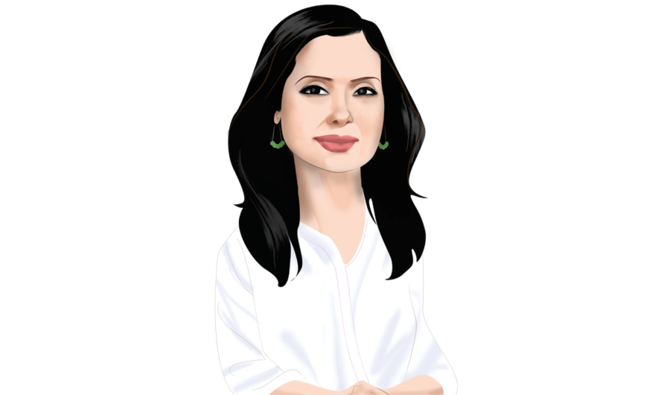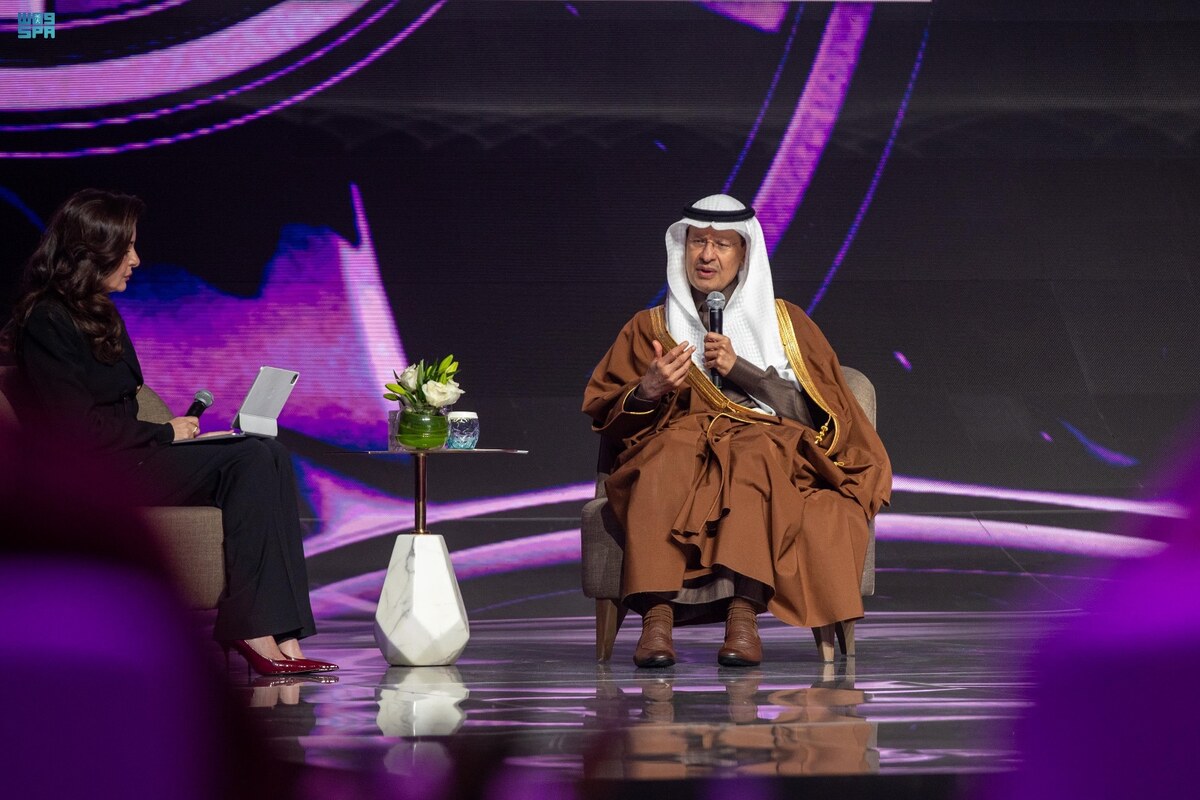It is the time for New Year resolutions, and this is mine: To interview more women for Arab News in this weekly slot.
I’ve said the same thing for several years running, only for my best intentions to fall through. There were more men available for interview, in positions of power and influence that made them natural subjects. Only 5 percent of the top 500 chief executives are women, according to Forbes magazine.
Not only are there fewer women available at the top of the executive tree, but many I approached were reluctant to appear in the public spotlight. There was a natural shyness, or a reluctance to appear in the media.
The problem is exacerbated in the Arab world. On more than one occasion, a woman who had agreed in principle to be interviewed came back to me later to reverse her decision because her father, or husband, or boss (invariably male) was against it. “They don’t want to see my picture in the papers” was a reason frequently cited.
I told Samar Alshorafa — who last year launched She is Arab, a public speaking and professional development business to serve the Middle East’s growing number of aspirational women — about my past failures and current ambitions, and she put her finger on the issue.
“I used to be one of those women. A lot of people don’t like speaking in public. They are naturally shy. It even has its own term — glossophobia — fear or anxiety about public speaking. But there are also societal and cultural barriers in the region that mean there are not enough women willing to assume a public role,” she said.
“This has meant that the big forums and conferences of the Middle East are still dominated by male speakers, and also that the women who are willing to take the stage are in excessive demand. Articulate women are over-invited and over-exposed. You see the same female faces time and again at events in the region,” she said.
The daughter of an entrepreneurial Palestinian family, she attended the American University in Cairo where she studied economics, but she felt hindered by a natural shyness and the absence of women she could identify as role models, especially in the business world.
“An entrepreneurial background was in my DNA, and after I graduated I was passionate about international development. I traveled widely across the Middle East and North Africa, and came across lots of amazing women I didn’t know were there. The role models I had grown up with were mainly from royalty, or were family members like mothers and aunts. But in Morocco, Egypt and Tunisia I found them in business too.
“The women are there, so it is not that they do not have a voice. I decided that the problem was that they do not have a platform on which to make their voice heard,” she added.
With a university friend — Noha Hefny, who shared her journey from Cairo via posts at some of the leading global policy organizations such as the UN, the International Finance Corporation, European Commission agencies and the Mohamed Bin Rashid Al Maktoum Foundation — she decided to do something about it. She is Arab, the firm launched last October after years of planning, is the response.
The firm is not just a speakers’ bureau, though it certainly is that, with around 100 of the region’s most successful female business executives and entrepreneurs on its books. It also provides training, consultancy and professional development services, as well as bespoke research for its clients. “It is a call to action,” Alshorafa said.
The start-up is certainly in tune with a changing global philosophy resonating throughout the Middle East. Female empowerment has become one of the big issues in global business, and a crucial part of the United Nations’ Sustainable Development Goals.
Governments in the UAE, Saudi Arabia and other countries have been waking up to the fact that there is an abundance of expertise and motivation among their female citizens, and have been taking steps to make the most of that latent talent, even if belatedly.
The UAE currently has nine female ministers of state, accounting for 28 percent of cabinet seats, and there was a recent decree to require 50 percent female representation in the Federal National Council. Last year the UAE pledged $15m to the UN’s gender equality programs.
A similar impetus is evident in Saudi Arabia, where Alshorafa is spending an increasing amount of her time. “Female employment in the private sector has increased by 130 percent since 2013, and we expect it to double again over the next few years. There has been a big increase in women’s employment in the retail and tourism sectors, at all levels, from junior roles dealing with the public to the senior executive leadership,” she said.
BIO
BORN Cairo, 1980
EDUCATION American University of Cairo, Economics with minors in business and international relations
CAREER Business Developer, Techno Group
Consultant, Abu Ghazaleh & Co. Consulting
Policy Reform Officer, Industrial Modernization Center
Operations analyst, International Finance Corporation
Manager, Mohammed Bin Rashid Al Maktoum Foundation
Gulf Region representative, Education for Employment
Co. founder, Hill Capital Group
Adviser and Chief Strategy Officer, Farm Food for Food Industries
Co-founder, She is Arab
She pointed to several women in senior positions within the Kingdom’s business community, and highlighted the work of Norah Faisal Alshaaban, a Saudi entrepreneur and member of the Shoura Council who has been working to prepare women for the growing opportunities of the labor market, expanding fast under the stimulus of the Vision 2030 strategy to diversify the economy.
“There is no shortage of talent in Saudi Arabia. I have met some amazing women there. The Kingdom invests a lot in education, and around 50 percent of all graduates are women. The business case for employing more women is there for all to see. In the past, Saudi Arabia’s great natural resource was oil — now it is the women of the Kingdom,” she said.
There is progress in gender equality in other areas too in the region. “Manels” — forum panels with only male speakers present — are increasingly a thing of the past.
“We’ve seen more men refusing to speak at events unless there are women present too, and that is a good thing. Gender equality will only come about if men are also committed to it,” Alshorafa said.
She is Arab also offers guidance to men who want to become “champions of diversity, to train men in techniques to become more inclusive.”
It is not simply a matter of getting more women up on stage to speak, however. In a survey of 70 female executives conducted before the launch of She is Arab, only nine had ever been paid for public speaking, she found.
“Some women feel uncomfortable asking for a fee for their speaking services or feel they should do it for free in return for the exposure. Sometimes, we recommend a woman should offer her services in return for the public exposure it brings, but that is not how it should always be,” she said.
She Is Arab is a business as much as a vehicle for the advancement of women. Incorporated in the In5 Tech start-up hub in Dubai Internet City, it gets revenue from commission from speakers, training fees, as well as consultancy fees for advisory services.
“There are multiple revenue streams,” Alshorafa said, adding that it was too early to talk about a range of speakers’ fees. Globally, top-paid speakers can make hundreds of thousands of dollars for a few hours’ work, but even the elite speakers’ bureaus now recognize there are business opportunities in the middle and lower-paid segment of the market.
Public speaking is a growing business, especially for women, and especially in the Middle East, as Alshorafa explained. Among a female population of more than 200 million, her research found that only 10 percent had any interest in public speaking. “But that is still more than 20 million women. So there is no shortage of talent, and I’d like to see as many of them as possible on the public stage.
“Everyone is on the planet for a reason, and we can all learn from other people’s stories. I would urge all women to go out there and share your story,” she said.
And, if they would like to share their stories with Arab News, they would help me keep my resolution for 2020.



























